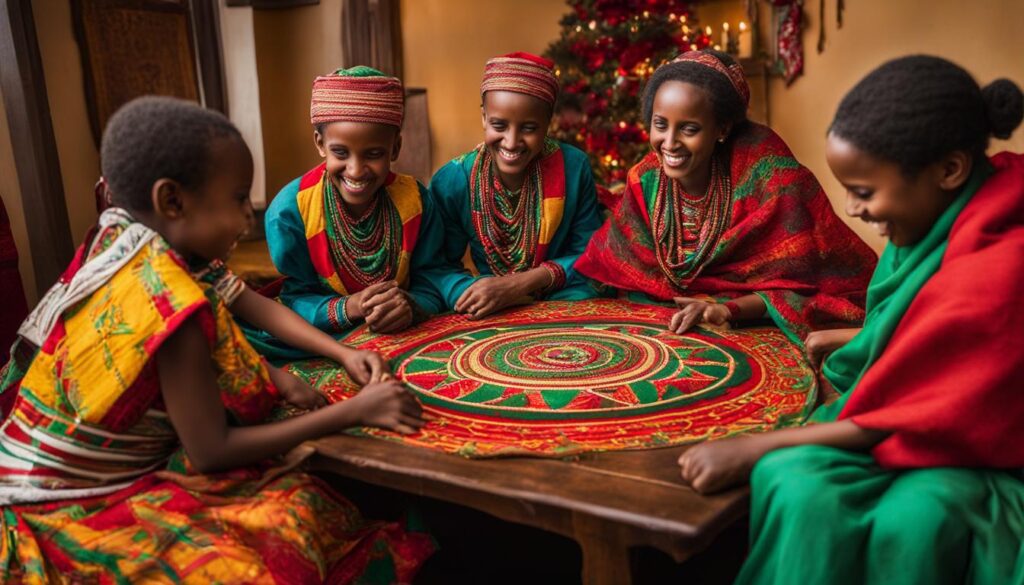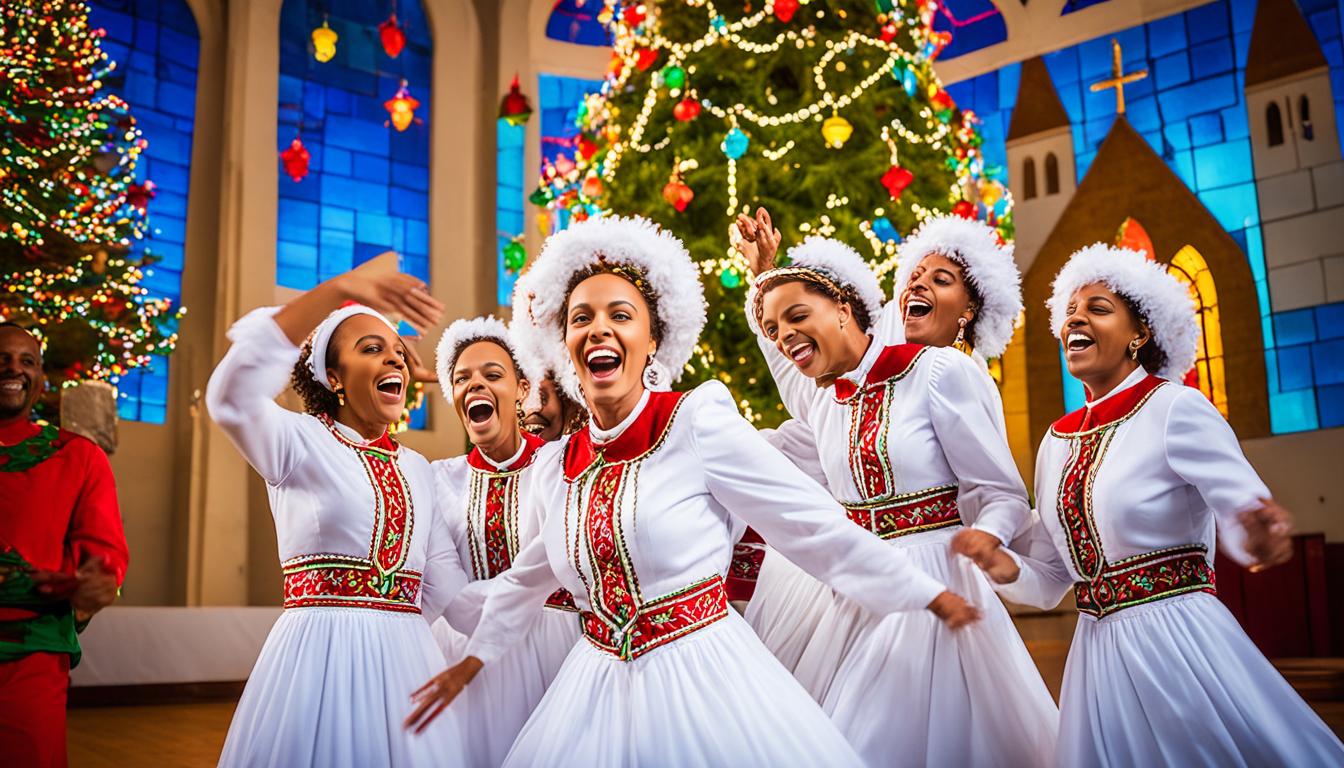How Do Ethiopia Celebrate Christmas?
Did you know that Christmas in Ethiopia is celebrated on a different date than in most parts of the world? While many countries observe Christmas on December 25th, Ethiopians celebrate this joyous holiday on January 7th. This unique cultural tradition is deeply rooted in the Ethiopian Orthodox Tewahedo Church and is marked by a range of customs and traditions that make it a truly special and fascinating experience.
Key Takeaways:
- Ethiopian Christmas is celebrated on January 7th, according to the Ethiopian Orthodox Tewahedo Church.
- Christmas celebrations in Ethiopia are rich in cultural customs and traditions.
- The fasting period of Tsome Nebiyat is observed before Christmas, lasting for 43 days.
- An overnight church service on Christmas Eve is a significant part of the celebration.
- The Gena game, a traditional sport, is commonly played during Ethiopian Christmas festivities.
Fasting and Preparation: Tsome Nebiyat
During the celebration of Ethiopian Orthodox Christmas, fasting and preparation play a significant role in the religious observance. Ethiopian Orthodox Christians observe a period of fasting known as Tsome Nebiyat, also referred to as the Fast of the Prophets. This fasting period is a time of spiritual cleansing and reflection, as believers abstain from consuming any animal products and psychoactive substances, including meat and alcohol.
Tsome Nebiyat lasts for 43 days, starting from 25 November and leading up to Christmas Day itself, which is celebrated on 7 January. This extended period of fasting is seen as a way to purify the body and soul in anticipation of the birth of Jesus. By practicing self-control and abstaining from indulgences, believers seek to strengthen their faith and draw closer to God.
“The Fast of the Prophets is a time of self-discipline and spiritual preparation for the Ethiopian Orthodox Christmas celebration. Through fasting, we cleanse our bodies and minds, focusing our thoughts on the significance of Christ’s birth.”
During the fasting period, Ethiopian Orthodox Christians typically consume a vegan diet consisting of grains, legumes, fruits, and vegetables. This dietary restriction serves as a reminder of the simplicity and humility of Jesus’ birth and emphasizes the importance of self-sacrifice and spiritual devotion.
The Fast of the Prophets holds a sacred place in the hearts of Ethiopian Orthodox Christians, as it allows them to experience a deeper connection with their faith and prepares them for the joyous celebration of Christmas. It is a time of introspection and renewal, as believers seek to strengthen their relationship with God and live in accordance with the teachings of Jesus.
In the next section, we will explore the Christmas Eve celebration and the significance of the overnight church service in Ethiopian Christmas traditions.
| Fasting Period | Start Date | End Date |
|---|---|---|
| Tsome Nebiyat (Fast of the Prophets) | 25 November | 6 January |
Christmas Eve Celebration: Overnight Church Service
On Christmas Eve, Ethiopian Christians participate in a sacred and deeply meaningful overnight church service as part of their Christmas traditions. This overnight service holds significant religious importance, symbolizing the anticipation and waiting for the birth of Jesus. The service typically begins around 6:00pm and continues until 3:00am the following day, creating a solemn and reverent atmosphere.
During the overnight church service, believers gather in their local churches to honor the birth of Jesus through prayers, hymns, and rituals. The service is led by a priest who guides the congregation in their devotions. A highlight of the service is the long procession that takes place around the church.
The procession involves participants carrying lit candles as they walk in a circular formation around the church. This symbolic act represents the journey to Bethlehem, reflecting the biblical narrative of the birth of Jesus. The priest leads the procession, bestowing blessings upon the worshippers as they walk.
This powerful ritual creates a sense of unity and spiritual connection among the participants. The soft glow of the candlelight illuminating the darkness adds to the ambiance, evoking a sense of peace and humility.
The overnight church service during Ethiopian Christmas is a time of deep reflection, prayer, and reverence. It allows believers to come together as a community, reaffirm their faith, and celebrate the joyous occasion of Jesus’ birth.
The Festive Attire and Gena Game

On Christmas Day, Ethiopians don their traditional white cotton garment known as netela. This attire, adorned with colorful stripes at the ends, adds a touch of vibrancy to the celebrations. The netela is a symbol of cultural pride and is worn by both men and women during the festive season.
In addition to the colorful attire, another cherished tradition during Ethiopian Christmas is the Gena game. This traditional field hockey-like sport brings communities together as two teams engage in passionate competition. The game involves players trying to throw a wooden ball in the air and hit it with sticks, aiming to prevent the opposing team from bringing the ball to their village or scoring it in their goal.
Historical Significance
The Gena game holds historical significance in Ethiopian culture, dating back centuries. It is believed to have originated from a game played by shepherds to pass the time during the Christmas season. Over time, it evolved into a larger-scale game played between neighboring villages, fostering camaraderie and competition.
“The Gena game is more than just a sport; it embodies the spirit of unity and friendly rivalry that defines our Christmas celebrations.”
Playing the Gena Game
The Gena game is played on an open field, typically between villages. The teams are distinguished by their colorful attire and compete with vigor, showcasing their skill, agility, and teamwork. The game is not only about physical prowess but also strategic thinking, as players maneuver the ball and make strategic passes to outwit the opposing team.
The Gena game is not just about winning; it is about celebrating the joy of Christmas and fostering a sense of community. The festive atmosphere, cheers, and laughter envelop the field as players and spectators alike immerse themselves in the spirit of the game.
Comparing Ethiopian Christmas Attire
| Traditional Attire | Description |
|---|---|
| Netela | A white cotton garment adorned with colorful stripes at the ends |
| Other Traditional Garments | Variations of cultural attire specific to different regions of Ethiopia |
Lalibela: A Pilgrimage Destination

Lalibela, a town in Ethiopia, is a captivating destination for pilgrims seeking a unique and spiritually enriching experience during Ethiopian Christmas. Situated in the northern part of the country, Lalibela is renowned for its remarkable rock-hewn churches, which hold deep religious and cultural significance.
The Lalibela churches, also known as the “New Jerusalem,” consist of eleven interconnected structures, each carved out of a single piece of rock. These architectural wonders are believed to have been constructed in the 12th century under the direction of King Lalibela.
“The Lalibela churches are a testament to the ingenuity and devotion of the Ethiopian people. They are not just religious sites but also magnificent works of art.”
During Ethiopian Christmas, the Lalibela churches become a focal point of pilgrimage. Thousands of believers from all over Ethiopia and beyond make the journey to Lalibela to attend the Christmas service in these sacred sites. The atmosphere is filled with reverence and awe as worshippers come together to celebrate the birth of Jesus.
The Spiritual and Cultural Significance
The Lalibela Christmas festivities are an extraordinary blend of spiritual devotion and cultural traditions. The churches are beautifully adorned with colorful decorations and illuminated by candlelight, creating a mystical ambiance that adds to the sense of holiness and reverence.
The pilgrimage to Lalibela is not only a religious experience but also an opportunity to engage with the rich heritage and history of Ethiopia. Visitors can explore the intricate carvings and architectural marvels, marveling at the ancient craftsmanship that has withstood the test of time.
A Vibrant and Festive Atmosphere
The town of Lalibela comes alive during Ethiopian Christmas, with an array of festivities that attract both locals and tourists. The streets are adorned with vibrant decorations, and the air is filled with music, dance, and the scent of traditional Ethiopian cuisine.
Visitors can immerse themselves in the lively celebrations, joining in traditional dances and partaking in the delicious culinary delights of Ethiopian Christmas. The joyful spirit of the occasion is contagious, creating an unforgettable experience for all who attend.
As the saying goes, “To go to Lalibela is to go to heaven.” This pilgrimage destination offers a unique opportunity to connect with Ethiopian culture, spirituality, and history, making it a must-visit for anyone seeking a truly transformative Christmas experience.
Ethiopian Christmas Traditions and Celebrations
Ethiopian Christmas is a time of joy, community, and rich cultural traditions. Unlike the commercialized holiday celebrations seen in many parts of the world, Ethiopian Christmas focuses on faith, family, and shared experiences. Let’s explore some of the unique traditions and customs that make this holiday special.
Gatherings and Traditional Meals
During Ethiopian Christmas, families come together to celebrate and enjoy a traditional Christmas meal. A centerpiece of this feast is the famous dish called doro wat. Doro wat is a spicy stew made with chicken and whole boiled eggs, simmered in a flavorful blend of spices and served with injera, a sourdough flatbread that acts as both a utensil and a side dish.
The rich flavors of doro wat and injera are a true delight for the taste buds, and the shared meal creates a sense of unity and togetherness among family members and loved ones.
The Gena Game
The Gena game, a traditional Ethiopian sport, is an integral part of the Christmas festivities. Played in the open fields between villages, this game resembles a cross between field hockey and soccer. Two teams compete against each other, aiming to hit a wooden ball with sticks and prevent the opposing team from scoring.
The Gena game holds historical significance and symbolizes the power of teamwork and friendly competition. It brings communities together, fostering a sense of camaraderie and joy during the Christmas season.
Religious Services and Devotion
Attending religious services is a vital part of Ethiopian Christmas. The Ethiopian Orthodox Tewahedo Church plays a central role in the celebrations, with worshippers attending a midnight mass known as the Liturgical Service of Christmas.
The solemn and vibrant atmosphere of the church fills with beautiful hymns, prayers, and spiritual reflection. Devotees express their deep faith and reverence during this service, connecting with the religious and historical significance of Christmas.
Now, imagine the vibrant colors, the festive gatherings, the tantalizing aromas of the traditional meal, and the joyful sounds of the Gena game. Ethiopian Christmas is a truly enchanting and culturally rich experience that showcases the deep respect and devotion of the Ethiopian people.
| Traditions | Food | Customs |
|---|---|---|
| Gatherings and Traditional Meals | Doro Wat | The Gena Game |
| Religious Services and Devotion | Injera | Attending Midnight Mass |
Conclusion
Ethiopian Christmas, celebrated on January 7th, is a truly special holiday that provides a unique and culturally rich experience. The traditions, rituals, and festivities associated with this holiday offer a glimpse into the deep religious beliefs and rich heritage of the Ethiopian people.
From the period of fasting known as Tsome Nebiyat to the overnight church service and the exciting Gena game, Ethiopian Christmas is a time of reflection, celebration, and communal gatherings. It is a time when families and communities come together to honor the birth of Jesus and to strengthen their spiritual connections.
Whether it’s the beautiful white attire, the delicious traditional meals shared with loved ones, or the pilgrimage to the rock-hewn churches of Lalibela, Ethiopian Christmas is a truly special holiday that should be experienced by all who have a love for culture and spirituality. The festivities and customs associated with this holiday create a vibrant and festive atmosphere that is a testament to the rich traditions of Ethiopia.







